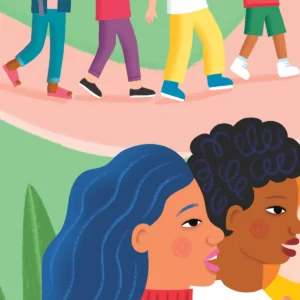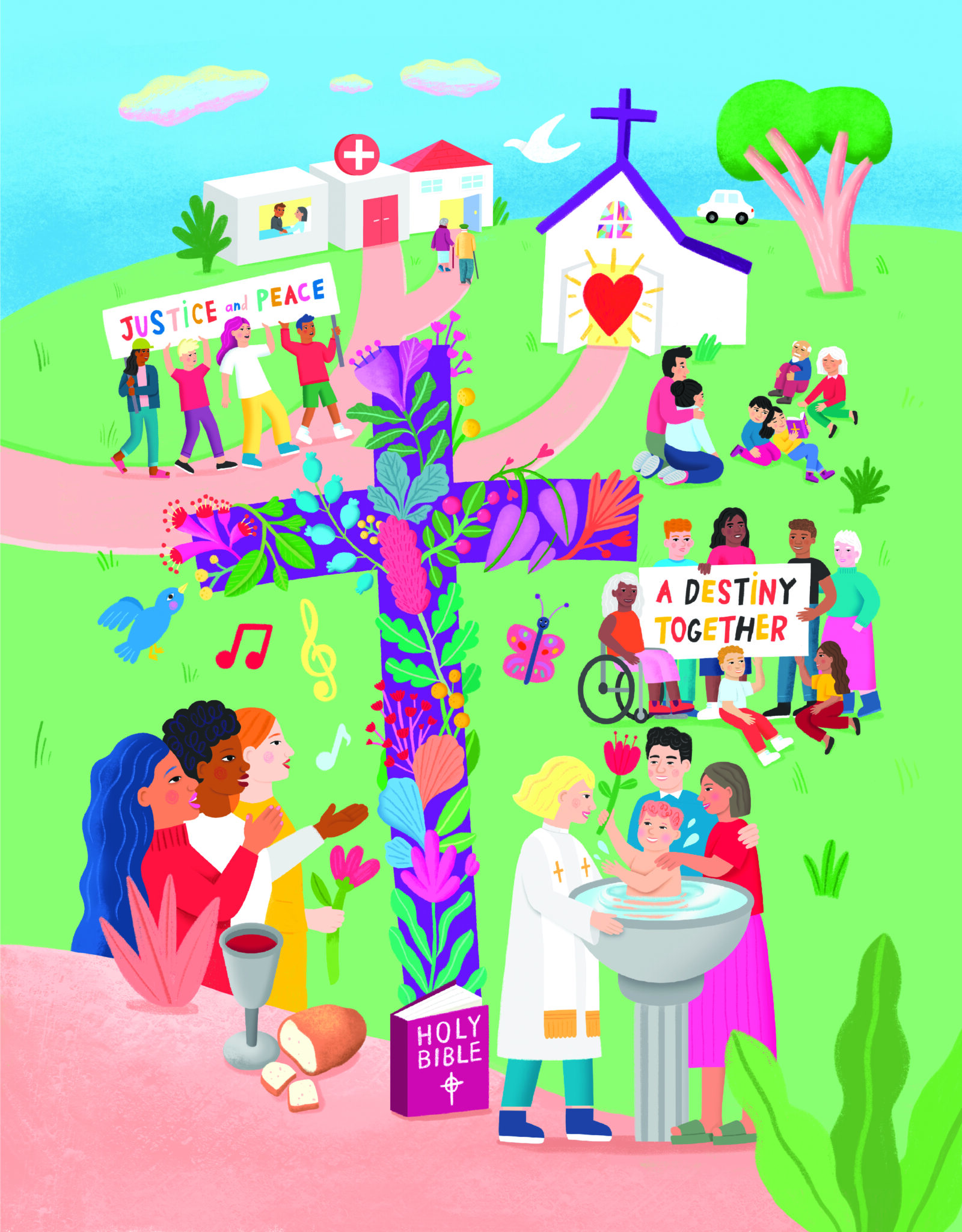This is the Act2 report to the 17th Assembly. It tells the story of what we have heard, what we have done, and what we could do differently in the future. It is the fourth report of the Act2 Project after the earlier reports including Act2: In Response to God’s Call (June 2023).
This report includes:
- A summary of what we did between the 16th and 17th Assemblies (Chapter 1).
- Three chapters on three different themes:
- Who we are as the Uniting Church (Chapter 2).
- What we do as a national Church (Chapter 3).
- Our theological culture and education (Chapter 5).
- A summary of what people told us about the four Directions from our report last year. The Directions were about local communities of faith and discipleship (Chapter 4).
- A summary of what people told us about the four Options from our report last year. The Options were about how our church might work together in the future and share what we have with each other (Chapter 6).
- Proposals for the 17th Assembly (Chapter 7).
- A plan for putting the proposals in place if they are passed by the Assembly (Chapter 8).
Considering Afresh
Introduction
Since our last report in June 2023, the Act2 team:
- Reached out directly to our 1,672 local communities of faith.
- Reached out directly to all our Synods and Presbyteries. We were able to speak with people in 12 Presbyteries. Our team was at five Synod meetings.
- Spoke with the Assembly Standing Committee and Assembly leaders.
- Spoke with people and leaders in the UnitingCare Australia network.
- Reached out to the regional committees of the Uniting Aboriginal and Islander Christian Congress (UAICC).
- Reached out to Synod multicultural networks and the Chairs of our 13 National Conferences.
- Held 12 focus groups with leaders in different kinds of communities.
- Held five forums which looked at things we do as a national Church.
- Held open drop-in sessions on Zoom every two weeks.
During the Collective Discernment phase, the Act2 team received:
- Feedback from 223 groups of people who had talked together about the Directions and Options. Around 2,028 people took part in these groups.
- Feedback from 108 individual members of the Uniting Church.
- 77 written submissions from councils, agencies, theological colleges, networks and individuals.
- 37 papers and reflections on the theological culture of the Uniting Church.
- We’ve thought about our identity in two different ways – who we are as the whole Uniting Church, and our theological identity.
- Whenever we’ve asked people about things they value about the Uniting Church, they’ve often mentioned the same things: our Covenant with Congress, our multiculturalism, gender equality in leadership, our love for justice and our ministry of the whole people of God.
- We have so many gifts from God in our rich history. All those big moments and statements in our past still feed our life now and help us know who we are. They are like deep wells; we can keep drawing and learning from them.
- Our divides over sexuality are not fixed. There is hurt and pain. But Jesus holds us together and we want to find a way forward together.
- The world where we do our ministry and mission is changing fast. We need to do stronger and more creative thinking about how to be faithful disciples of Jesus and how to equip all our people for their ministries.
- Even though we love the Covenant, we have struggled to live it out.
- We have also struggled to be truly by be a multicultural, cross-cultural and intercultural Church.
Transcending Boundaries
Participating in National Life and Work
- We still want to be able to speak strongly on issues in our community and the world. We need to speak with humility as the church is not at the centre of society anymore. The more we know what Uniting Church communities think and feel, the better we’ll know what to say.
- We still value our Church partners overseas and our friendships with other churches and Christians. They help us learn and see beyond ourselves.
- The national Church has certain jobs to do in our theological culture. It can help us talk about things we disagree on, help us learn from other churches and help us understand the commitments we’ve made through our history.
- The Assembly can see across the whole Church and so can connect people to talk and work together. It will need to know the rest of the Church well.
- Currently, our national Church doesn’t have the money or people it needs to do the jobs it has been given. More resources are needed. This will help make our national work and identity stronger and more connected to our local people and communities.
Building One Another Up in Love
Life Giving Communities of Faith and Discipleship
These are the main things people told us about the Directions in our last report:
- People really like the idea of working more on growing disciples, but our communities are all different, so this will look different in different places.
- People like the way the Basis of Union imagines Congregations. This might be able to free us from what we often think a Congregation has to look like.
- We have some communities and ministries that don’t fit the vision of Congregations. They have a place in our life and we should explore that more.
- People like the idea of different parts of the Uniting Church working together, like community services and Congregations. It might only work in some places though, and it will need some support.
- We don’t know exactly what we mean when we talk about ‘discipleship’, ‘mission’ and ‘evangelism’. We need to think more about these. It might help our communities think about them too and put them into practice.
- People like the idea of having more flexibility in how they run their local church. There are some questions about how the wider Church might get involved and whether having lots of different practices will hurt our identity.
- People spent a lot of time reflecting on how our local communities begin and end. Supporting communities as they begin and end is important. It needs to be easier for new communities to join our Church. We have mixed feelings about our communities ending. For some of us it’s very sad, and for others it means we can say thank you for the past and try new things.
Act2 Response to the feedback on the Directions
- Overall, people really liked and supported the four Directions. The Act2 team has used the feedback to create the proposals you can find in Chapter 7.
- Our local communities are the beating heart of our Church. Discipleship and mission should be the centre of their life, supported by the whole Church.
To Hear Anew
Cultivating our Theological Culture and Education
- To help us think about our theology, we got lots of great reflections from Uniting Church theologians. We also gathered our leaders in theological education and formation to talk together about the future.
- As a Church we think about Jesus and our lives as Christians in many different ways. We live these out differently too. We should embrace this.
- There are weaknesses in how we do our theological work. We have sometimes excluded some people’s voices. We haven’t done enough to help lay people.
- We have so much to learn from Indigenous theology and spirituality. It can help our thinking and witness be stronger and richer.
- We need spaces where we can talk together about our differences and disagreements on theology. These spaces should be open to all.
- The better we understand who and whose we are, the better our discipleship and mission will be.
- We really want to work together on how we think and learn theologically and how we form people for ministry.
In Service of the Gospel
Ordering our Life
People told us about many themes in their feedback on the Options. A key theme was that people want us to be bold and courageous.
Here is a summary of what people said to us about the Options in our last report:
- Option 1 proposed a three-council model. This was the most popular option. People liked the boldness of the change and that it reduces the layers of our Church. People were worried about how difficult it would be to change to this option and how long it would take. They were also worried that barriers in our culture may stop ambitious change from happening.
- Option 2 proposed a four-council model with a strong Regional Council and smaller National Council. This was the least popular option. Some liked the strong Regional Council. Most felt the spread of responsibilities between the councils wasn’t right. Many thought it would confuse our voice and identity.
- Option 3 proposed a four-council model with larger National and Area councils and Regional Councils focussed on property. There was a mixed response to this option. People liked that strong Area Councils would mean strong support of Congregations. They were worried about separating ministry and mission from property. Many saw it as just a step along the way to a bigger change.
- Option 4 proposed four councils with a way for us to share our resources. There was a mixed response to this option. It was seen as the least difficult but also the closest to what we currently have. Some liked the idea of sharing money but felt we didn’t have strong enough relationships to make it work.
Go Forward Together
A Way Forward
Proposals for the 17th Assembly focus on three areas: local communities of faith, theological culture and education, and governance and resourcing. For each area there is a vision guiding the work and some key changes.
Stream A. Life-giving Communities of Discipleship and Mission
Vision: Communities of faith will sustain a life of worship, build one another up in love, grow disciples of Jesus and participate in God’s mission. These diverse communities will shape their life in response to God’s call in their context and deepen their relationship with God, one another, the wider Church and the world.
Key Changes:
- Focus on discipleship and mission.
- A new toolkit for fit-for-purpose local governance.
- Better beginnings and endings for communities.
- Review and change the rules about church membership.
Stream B. Vision for A Network for a Flourishing Theological Culture
Vision: A visible and accessible network of intentional communities engaged in life-long learning to equip people to courageously follow Jesus and participate in God’s mission in contemporary Australia.
Key Changes:
- A Commission for Theology, Formation and Leadership.
- A national, multi-campus theological college.
- A national structure to support responsibilities for theological culture.
- Theological work on ‘discipleship’, ‘evangelism’, ‘mission’ and ‘diaconal communities’.
Stream C. Vision for Sharing Our Life and Our Common Wealth:
Vision: A network of deeply connected councils responding to God’s call to enter more fully into mission through healthy oversight of ministry and mission, celebrating our shared identity and being faithful stewards of our common wealth.
Key Changes:
- A Commission for Governance, Resourcing and Administration.
- Continue to work on a better governance model, including either a different three-council or a better four-council model for our governance.
- While we work on our governance model, also work on other changes we can make now to help our Church be more like the Vision.
- Develop a roadmap and a way for us to share resources across the whole Church.

Implementing a Way Forward
We think it will take the next six years to make all of these changes. Some will take less time. The 18th Assembly will need to make some further decisions before the work is done. If the Assembly agrees to the proposals with think here will be three areas of work:
Stream A. Life Giving Communities of Discipleship and Mission (July 2024 to June 2027)
- Every part of our Church turns its resources to discipleship and mission.
- New rules about local governance start in 2026.
- The 18th Assembly will decide about new proposals about church membership (July 2027).
- The Assembly Standing Committee oversees this work.
Stream B. A Network for a Flourishing Theological Culture (July 2024 to July 2027)
- Design and move to a National Network for Theology, Formation and Leadership, including a national multi-campus theological college.
- Organised theological work on ‘mission’, ‘evangelism’, ‘discipleship’ and ‘diaconal communities’.
- The Commission for Theology Formation and Leadership oversees this work.
Stream C. Sharing Our Life and Our Common Wealth (July 2024 to July 2027)
- Transition (July-Dec 2024):
- Work on establishing the new Commission for Governance, Resourcing and Administration.
- Assess and Prepare (Jan 2025-June 2027):
- Continue to work on a three-council and four-council model for our governance (Jan 2025-June 2026).
- Work on changes we can make now to help our Church be more like the Vision (Jan 2025-June 2026).
- Develop a roadmap and a way for us to share resources across the whole Church (July 2026-June 2027).
- Decide and Approve (July 2027):
- The 18th Assembly will decide about the model, roadmap and changes to our Constitution.
- Other councils of the Church may then need to approve the decision.
- The Commission for Governance, Resourcing and Administration oversees this work.

